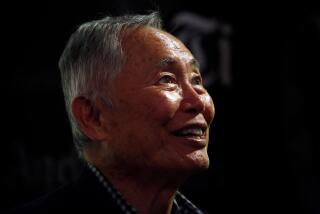Time to add his political voice
- Share via
A few “Star Trek” fans were shocked by the official revelation that actor George Takei -- aka Mr. Sulu -- is gay. But most accepted the news with the respect for diversity that devotees say is the hallmark of the sci-fi series.
Takei, 68, revealed his homosexuality in the current issue of Frontiers, a biweekly Los Angeles magazine covering the gay and lesbian community. Takei said he and his partner of 18 years, Brad Altman, have been open about their relationship to friends and family for many years.
What prompted his recent disclosure to the media, he said, was Gov. Arnold Schwarzenegger’s veto of a same-sex marriage bill in September.
“The world has really changed,” Takei said. “We now have Time magazine doing a cover story on gay teens. Now that the movement is reaching this point, something unimaginable when I was a teenager, I think I have a responsibility to add my voice. I thought that it was time.”
Takei likened his experience of coming out publicly to a walk down a long corridor: “At first, it’s narrow and dark, then it starts to widen a bit, there are windows that let in some light, then doors that open that give you the prospect of a path to take.”
It’s an image that also reflects on Takei’s early years. When he was a child and young teen, Takei’s family was interned during World War II, with his relatives split between two U.S. camps.
For years after the war, he said he carried a public shame about being Japanese American and a private shame that came from knowing he was gay.
“When I was in the internment camp, I pledged allegiance to the flag,” he recalled. “The words were ‘liberty and justice for all.’ I was too young to appreciate the irony of the sight of the barbed wire fence and the guard towers. But the irony of the words for me and for other gay people is penetrating.”
Reaction on the Internet included shock and tasteless jokes, as well as praise and good wishes that Takei live long and prosper.
“He must have chosen that magazine called Frontiers as I guess it must have been the final frontier for him to come out,” wrote one blogger on starwars .com.
Adam Malin, co-chief executive of Creation Entertainment, which produces the official “Star Trek” convention in Las Vegas every year, predicted that the overall fan reaction would be one of acceptance.
“People in the ‘Star Trek’ fan universe are extremely accepting.... We all love George.” He added that the show’s creator-producer, Gene Roddenberry, “certainly believed in accepting all kinds of gender orientation. He stated that clearly.”
Takei said his role on the cult sci-fi hit “Star Trek” (NBC 1966-69) was one of the windows that let light in.
His character, Mr. Sulu, was part of an ethnically, racially and culturally diverse leadership team -- an idea somewhat ahead of its time. “The idea of diversity as espoused by Gene Roddenberry was part of my broadening horizon,” Takei said.
Currently, Takei is starring as Dr. Martin Dysart in the East West Players’ revival of “Equus,” at Los Angeles’ David Henry Hwang Theater through Dec. 4.
In addition to acting, Takei has been active in politics. In 1973, the actor ran for the Los Angeles City Council and lost by a small margin. He was appointed by Mayor Tom Bradley to the board of directors of the Southern California Rapid Transit District the same year and was President Clinton’s appointment to the board of the Japan-United States Friendship Commission. In 1986, Takei became the first Japanese American actor to have a star on Hollywood’s Walk of Fame.
Takei, who lives in Los Angeles, said he plans to continue speaking out against the various initiatives being proposed for the June ballot that would limit gay rights.
“This is a different kind of barbed wire fence,” he said. “It would incarcerate a whole group of people in a different kind of internment camp.”
In the Frontiers article, he called Schwarzenegger “a dangerous politician, in the same way that Strom Thurmond or other politicians who say one thing in order to try to curry a broad base of support, and then when push comes to shove, they act in a segregationist way.” The governor’s office declined to comment.
More to Read
The complete guide to home viewing
Get Screen Gab for everything about the TV shows and streaming movies everyone’s talking about.
You may occasionally receive promotional content from the Los Angeles Times.






